
Aarti Dhingra

Aarti graduated from the School of Planning and Architecture, Delhi in 2015. Her graduation thesis investigated the psychological impact of space, rethinking the typology of correctional institutes to deal with child delinquency, rehabilitation and social-reintegration. After graduating, she worked with Professor MN Ashish Ganju for environmental development projects in informal settlements in Delhi, and a school project for Buddhist nuns that explores sustainable building practices in the foothills of the Himalayas. Her fascination for working in the mountains with natural materials took her then to the rural Himalayas of Kumaon, where she lived for almost 3 years and worked as Site Architect at construction sites, collaborating with different architects from India and abroad. She also initiated independent projects with local craftsmen and NGOs for designing rural home-stays, and learning and implementing techniques of native-forest and heritage conservation for the region
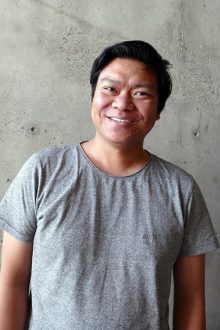
Kezang Dorji

Kezang (*1991,Bhutan) received his Bachelor’s studies in Urban Planning from Lovely Professional University (LPU), Punjab, India in 2015. He is an Urban Planner at Thimphu Thromde (Municipality) since his appointment in 2016 by Royal Government of Bhutan (RGoB). He is enthusiastic on learning and practicing urban spatial functions and its co-relation with surrounding factors in promoting and achieving the goals of Gross National Happiness (GNH) which is central guiding force of Bhutan’s growth. Recently, he completed a design project of Norzin Lam Urban Design, which envision to enhance social vitality of city through urban space. He and his team had also successfully organized two street fest with a slogan “Street for People” in the busiest street of capital for 3 days with various social programs to create vibrant city and society and giving back people’s street. His interest in harmonizing sustainable urbanism and GNH has inspired him to purse the IUSD program and during his study, he hopes to be equipped with relevant ideas and knowledges that would help him in developing desired cities, GNH city.
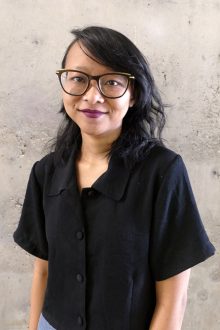
Usie Fauzia Anniza

Usie Fauzia Anniza was born in Bandung, Indonesia. She got her bachelor degree from School of Architecture, Planning, and Policy Development, Institut Teknologi Bandung (ITB), Indonesia. Since 2014, she has been active as an architect focusing on humanitarian architecture and community planning for various organizations. She is a co-founder of Architecture Sans Frontières Indonesia (ASF-ID). In 2017, their projects achieved Architecture without Borders Awards (category: Social Construction for Habitat) from Architecture Sans Frontières International. The works included: (1) Participatory Design & Construction of Pilot House in Tongkol Community in Jakarta, (2) Bamboo Bridge in Solo, (3) Farmer’s Shelter Design in Malang, and (4) Participatory Mapping in Cikapundung Riverbank Community Bandung. Before joining IUSD, she practiced as a technical facilitator for different types of communities in rural and urban areas and she was also involved in urban discourse research with ITB. Besides architecture, she spends her time practicing photography.
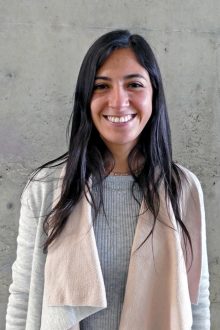
Melanie Nogales

Melanie (*1992, Lima, Peru) completed her Bachelor’s studies at UPC University in 2014. Throughout her studies she worked in different architecture studios in Lima where she took part in the development of projects of different scales and typologies. In 2016, she became a Teaching Assistant and also joined the Peruvian organization “Build Identity”, which allowed her to be part of an international research project which consists of comparing the challenges that different communities living inside the tropical rainforests have to face in their adaption to climate change, globalization and urban growth. This project enabled her to work directly with a community in Sumba, Indonesia, to do research in participatory approach. In 2018, she was a consultant at the Ministry of Education where she analyzed the current infrastructure in public schools in order to improve their quality in a national level. She currently organizes workshops in Indonesia where she encourages people to learn ecological techniques from local experts.
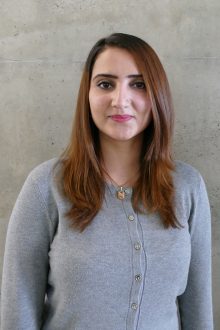
Saman Tariq

Saman completed her Bachelor studies in Architecture from National College of Arts, Rawalpindi, Pakistan. During her undergraduate degree, she received an excellent opportunity to travel to the United States on an exchange program. This experience helped her to broaden her vision towards cross-cultural interactions and the way developed world is moving towards sustainable practices. Right after her graduation in 2017, she joined a consultancy firm called Arch-Tech Engineering Consultants and indulged herself in various rehabilitation projects across different cities in Pakistan. Her groundbreaking project as a young and energetic architect called Heritage Trail, Peshawar led her to propose rehabilitation strategies for half a km long urban stretch along with providing building façade treatments. This project introduced her to the concepts of participatory planning, their effects, and outcomes and helped her to decide her future direction. Through IUSD, she aims to nurture her ideas and thought processes in order to acquire pragmatic solutions for challenging global issues.
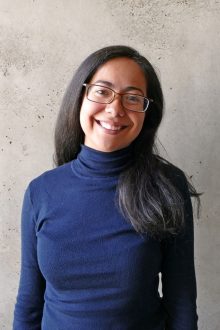
Vanessa García Otero

Vanessa (Cali, Colombia) graduated as an Architect from the National University of Colombia (Universidad Nacional de Colombia) with further studies in Territorial Analysis and Management. During the final stage of her undergraduate program she underwent the Research and Urban Project Emphasis, focusing on urban design and planning. She was also an active member of the Wood and Guadua Research Group at the same university, focusing in the development of sustainable architecture with local materials, wood and Guadua, and participating in joint projects with suburban and indigenous communities. Since then she has collaborated with architecture and urbanism offices and other foundations and social organizations. Her main interests reside on urban development with a social and sustainable approach, particularly in the Latinamerican context.

Sandra Nabih

Sandra (*1992) studied Architecture at Misr International University (MIU), Cairo, Egypt. During her studies she attended several workshops, partnering with Hochschule Luzern and an internship at Orascom Construction Industries. Through her education, she discovered her love for using architecture and design to shape people’s lives, her love for research, and landscape design. After graduation, she began her career by working as a junior Landscape Architect, then got appointed as a Teaching Assistant at MIU for four years, during which she continued freelancing as a Landscape designer. This experience expanded her mind immensely, as she discovered her passion for teaching and her ability to uncover each student’s unique potential. With students, she promoted human-centred design of architecture and urban spaces and worked on real life community service projects. She continued expanding her experience by working as the Design Office Manager and Head Architect of Target Landscape. Her exposure to the market in the scale of Landscape Architecture and Urban Design added a great measure to her knowledge and skills. This led her to apply to the MSc IUSD Program to further enhance her qualifications in aims of creating bigger change in the Egyptian society through a career she is passionate for
Students 2019

Aarti Dhingra

Aarti graduated from the School of Planning and Architecture, Delhi in 2015. Her graduation thesis investigated the psychological impact of space, rethinking the typology of correctional institutes to deal with child delinquency, rehabilitation and social-reintegration. After graduating, she worked with Professor MN Ashish Ganju for environmental development projects in informal settlements in Delhi, and a school project for Buddhist nuns that explores sustainable building practices in the foothills of the Himalayas. Her fascination for working in the mountains with natural materials took her then to the rural Himalayas of Kumaon, where she lived for almost 3 years and worked as Site Architect at construction sites, collaborating with different architects from India and abroad. She also initiated independent projects with local craftsmen and NGOs for designing rural home-stays, and learning and implementing techniques of native-forest and heritage conservation for the region

Kezang Dorji

Kezang (*1991,Bhutan) received his Bachelor’s studies in Urban Planning from Lovely Professional University (LPU), Punjab, India in 2015. He is an Urban Planner at Thimphu Thromde (Municipality) since his appointment in 2016 by Royal Government of Bhutan (RGoB). He is enthusiastic on learning and practicing urban spatial functions and its co-relation with surrounding factors in promoting and achieving the goals of Gross National Happiness (GNH) which is central guiding force of Bhutan’s growth. Recently, he completed a design project of Norzin Lam Urban Design, which envision to enhance social vitality of city through urban space. He and his team had also successfully organized two street fest with a slogan “Street for People” in the busiest street of capital for 3 days with various social programs to create vibrant city and society and giving back people’s street. His interest in harmonizing sustainable urbanism and GNH has inspired him to purse the IUSD program and during his study, he hopes to be equipped with relevant ideas and knowledges that would help him in developing desired cities, GNH city.

Usie Fauzia Anniza

Usie Fauzia Anniza was born in Bandung, Indonesia. She got her bachelor degree from School of Architecture, Planning, and Policy Development, Institut Teknologi Bandung (ITB), Indonesia. Since 2014, she has been active as an architect focusing on humanitarian architecture and community planning for various organizations. She is a co-founder of Architecture Sans Frontières Indonesia (ASF-ID). In 2017, their projects achieved Architecture without Borders Awards (category: Social Construction for Habitat) from Architecture Sans Frontières International. The works included: (1) Participatory Design & Construction of Pilot House in Tongkol Community in Jakarta, (2) Bamboo Bridge in Solo, (3) Farmer’s Shelter Design in Malang, and (4) Participatory Mapping in Cikapundung Riverbank Community Bandung. Before joining IUSD, she practiced as a technical facilitator for different types of communities in rural and urban areas and she was also involved in urban discourse research with ITB. Besides architecture, she spends her time practicing photography.

Melanie Nogales

Melanie (*1992, Lima, Peru) completed her Bachelor’s studies at UPC University in 2014. Throughout her studies she worked in different architecture studios in Lima where she took part in the development of projects of different scales and typologies. In 2016, she became a Teaching Assistant and also joined the Peruvian organization “Build Identity”, which allowed her to be part of an international research project which consists of comparing the challenges that different communities living inside the tropical rainforests have to face in their adaption to climate change, globalization and urban growth. This project enabled her to work directly with a community in Sumba, Indonesia, to do research in participatory approach. In 2018, she was a consultant at the Ministry of Education where she analyzed the current infrastructure in public schools in order to improve their quality in a national level. She currently organizes workshops in Indonesia where she encourages people to learn ecological techniques from local experts.

Saman Tariq

Saman completed her Bachelor studies in Architecture from National College of Arts, Rawalpindi, Pakistan. During her undergraduate degree, she received an excellent opportunity to travel to the United States on an exchange program. This experience helped her to broaden her vision towards cross-cultural interactions and the way developed world is moving towards sustainable practices. Right after her graduation in 2017, she joined a consultancy firm called Arch-Tech Engineering Consultants and indulged herself in various rehabilitation projects across different cities in Pakistan. Her groundbreaking project as a young and energetic architect called Heritage Trail, Peshawar led her to propose rehabilitation strategies for half a km long urban stretch along with providing building façade treatments. This project introduced her to the concepts of participatory planning, their effects, and outcomes and helped her to decide her future direction. Through IUSD, she aims to nurture her ideas and thought processes in order to acquire pragmatic solutions for challenging global issues.

Vanessa García Otero

Vanessa (Cali, Colombia) graduated as an Architect from the National University of Colombia (Universidad Nacional de Colombia) with further studies in Territorial Analysis and Management. During the final stage of her undergraduate program she underwent the Research and Urban Project Emphasis, focusing on urban design and planning. She was also an active member of the Wood and Guadua Research Group at the same university, focusing in the development of sustainable architecture with local materials, wood and Guadua, and participating in joint projects with suburban and indigenous communities. Since then she has collaborated with architecture and urbanism offices and other foundations and social organizations. Her main interests reside on urban development with a social and sustainable approach, particularly in the Latinamerican context.

Sandra Nabih

Sandra (*1992) studied Architecture at Misr International University (MIU), Cairo, Egypt. During her studies she attended several workshops, partnering with Hochschule Luzern and an internship at Orascom Construction Industries. Through her education, she discovered her love for using architecture and design to shape people’s lives, her love for research, and landscape design. After graduation, she began her career by working as a junior Landscape Architect, then got appointed as a Teaching Assistant at MIU for four years, during which she continued freelancing as a Landscape designer. This experience expanded her mind immensely, as she discovered her passion for teaching and her ability to uncover each student’s unique potential. With students, she promoted human-centred design of architecture and urban spaces and worked on real life community service projects. She continued expanding her experience by working as the Design Office Manager and Head Architect of Target Landscape. Her exposure to the market in the scale of Landscape Architecture and Urban Design added a great measure to her knowledge and skills. This led her to apply to the MSc IUSD Program to further enhance her qualifications in aims of creating bigger change in the Egyptian society through a career she is passionate for
